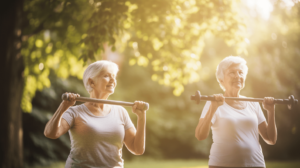Did you know that as women age, they are at a higher risk of developing osteoporosis, a condition that weakens the bones and increases the likelihood of fractures?
In fact, according to the National Osteoporosis Foundation, about 80% of those affected by osteoporosis are women. This statistic highlights the importance of bone health in aging women and the need to understand the connection between weight and bone health.
Maintaining strong bones is crucial for women as they age, and weight plays a significant role in determining bone health. Being overweight or underweight can both have adverse effects on bone density and strength.
In this article, we will explore the connection between weight and bone health in aging women, delve into the factors that can influence bone health, and provide strategies for maintaining strong bones as you age. So, let’s dive in and discover how you can care for your bones and serve your body well for years to come!
Key Takeaways
- Bone health becomes increasingly important as women age.
- There are steps that can be taken to optimize bone health.
- Weight plays a significant role in bone health for aging women.
- Healthcare professionals can offer guidance and support in maintaining and improving bone health.
The Importance of Bone Health in Aging Women
Did you know that by the age of 80, women have a 50% chance of experiencing a fracture due to osteoporosis?
Your bones are the foundation that supports your body and allows you to move, so it’s important to keep them strong and healthy.
Taking care of your bone health involves a combination of factors, including a balanced diet, regular exercise, and getting enough calcium and vitamin D. Calcium is essential for building and maintaining strong bones, while vitamin D helps your body absorb calcium.
By including calcium-rich foods like dairy products, leafy greens, and fortified foods in your diet, you can ensure that your bones are getting the nutrients they need. Regular exercise, especially weight-bearing exercises like walking or dancing, can also help improve bone density and reduce the risk of fractures.
As an aging woman, you may have a subconscious desire to serve others, and taking care of your bone health is one way you can do that. By maintaining strong and healthy bones, you can continue to be active and independent, allowing you to serve others to the best of your abilities.
Understanding the Relationship Between Weight and Bone Health
Understanding the relationship between weight and bone health can have a significant impact on our overall well-being. As an aging woman, it’s essential to recognize that maintaining a healthy weight is not only beneficial for our appearance, but also for the strength and resilience of our bones.
When we carry excess weight, especially around our midsection, it puts additional stress on our bones and can lead to a higher risk of fractures and osteoporosis. On the other hand, being underweight can also negatively affect bone health, as it can result in a decrease in bone density and increase the likelihood of fractures.
Finding a balance and maintaining a healthy weight is crucial for ensuring the longevity and vitality of our bones. This means engaging in regular physical activity to build and maintain muscle mass, as well as consuming a nutrient-rich diet that includes adequate amounts of calcium and vitamin D.
Remember that weight is not the sole determinant of bone health. Factors such as genetics, hormone levels, and lifestyle choices also play a role.
Factors That Influence Bone Health in Women
One of the most crucial factors is your diet. Consuming a balanced diet that’s rich in calcium and vitamin D is essential for maintaining healthy bones. Calcium is the building block of bones, while vitamin D helps your body absorb calcium. Include dairy products, leafy greens, and fortified foods in your diet to ensure you’re getting an adequate amount of these nutrients.
Additionally, regular exercise is key to maintaining bone health. Weight-bearing exercises such as walking, jogging, and dancing can help strengthen your bones. Aim for at least 30 minutes of exercise most days of the week to keep your bones strong and healthy.
Another factor that can influence your bone health is your hormone levels. Estrogen, a hormone that declines as women age, plays a significant role in maintaining bone density. Hormone replacement therapy may be an option to consider if you’re experiencing hormonal imbalances that may affect your bone health.
Additionally, certain medications can impact bone health. Long-term use of corticosteroids, for example, can weaken bones. If you’re taking any medications that may affect your bone health, discuss this with your healthcare provider and explore alternative options if necessary.
Lastly, lifestyle choices such as smoking and excessive alcohol consumption can negatively impact bone health. Quitting smoking and limiting alcohol intake can help protect your bones as you age.
Strategies for Maintaining Strong Bones as You Age
Maintaining strong bones as you age is crucial for a healthy and active lifestyle. As an aging woman, there are several strategies you can incorporate into your daily routine to ensure the strength and health of your bones.
Here are four key strategies to consider:
- Stay active: Regular exercise, especially weight-bearing exercises like walking, jogging, dancing, or weightlifting, can help maintain bone density and strength. Aim for at least 30 minutes of moderate-intensity exercise most days of the week.
- Get enough calcium: Calcium is essential for bone health, so make sure you’re getting enough through your diet. Good sources of calcium include dairy products, leafy green vegetables, tofu, and fortified foods. Consider talking to your doctor about calcium supplements if you’re not getting enough through your diet alone.
- Get enough vitamin D: Vitamin D helps your body absorb and use calcium effectively. Spend some time outdoors in the sun to get natural vitamin D, or consider taking a vitamin D supplement if you’re not getting enough through sunlight and your diet.
- Avoid smoking and excessive alcohol consumption: Smoking and excessive alcohol consumption can negatively impact bone health. If you smoke, consider quitting, and if you drink alcohol, do so in moderation. These lifestyle changes can help maintain the strength and integrity of your bones as you age.
How Does Hormones and Metabolism Affect Bone Health in Aging Women?
As women age, decoding women’s health hormones metabolism becomes crucial for maintaining bone health. Fluctuations in hormone levels, specifically estrogen, can lead to decreased bone density and an increased risk of osteoporosis. Metabolism also plays a role, as a slower metabolism can impact the body’s ability to absorb essential nutrients for bone strength.
Seeking Professional Guidance for Optimal Bone Health
Seeking professional guidance is crucial for women to optimize their bone health as they age. While there are many strategies and lifestyle changes that women can implement on their own to maintain strong bones, consulting with a healthcare professional can provide valuable insight and personalized recommendations.
A healthcare professional will be able to assess your individual risk factors, such as family history, hormonal changes, and medical conditions, and develop a comprehensive plan to support your bone health. When you seek professional guidance, you’re taking a proactive approach to your bone health and ensuring that you’re receiving the best possible care.
A healthcare professional can conduct bone density tests to assess your bone strength and identify any potential issues early on. They can also provide guidance on proper nutrition and exercise to support bone health. Additionally, they can monitor your progress and make adjustments to your plan as needed.
By seeking professional guidance, you’re investing in your health and setting an example for others. As women, we have a subconscious desire to serve and care for others, and by taking care of our own bone health, we can inspire and empower those around us to do the same.
Frequently Asked Questions
What are the common risk factors for developing osteoporosis in women?
Common risk factors for developing osteoporosis in women include age, menopause, family history, low calcium intake, sedentary lifestyle, smoking, excessive alcohol consumption, and certain medical conditions or medications. Take care of your bones by prioritizing calcium-rich foods and regular weight-bearing exercise.
Is it possible to improve bone health through diet and exercise alone?
Absolutely! By maintaining a balanced diet rich in calcium and vitamin D, and engaging in weight-bearing exercises, you can build strong bones and improve bone health. It’s like giving your bones a superhero makeover!
Can menopause significantly impact bone health in women?
Yes, menopause can significantly impact bone health in women. As estrogen levels decrease during menopause, bone loss accelerates. It’s crucial to prioritize bone-strengthening activities and a diet rich in calcium and vitamin D to protect your bones.
Are there any specific exercises that are more effective in promoting bone health?
Looking for exercises that can boost your bone health? Well, have you ever wondered if weightlifting could be the key? Discover the surprising benefits of weightlifting for your bones and start serving your body today!
How often should women get their bone density checked as they age?
As you age, it is recommended that you get your bone density checked every 2 years. This will help identify any changes in bone health and allow for early intervention if needed. Don’t forget to prioritize your health!














